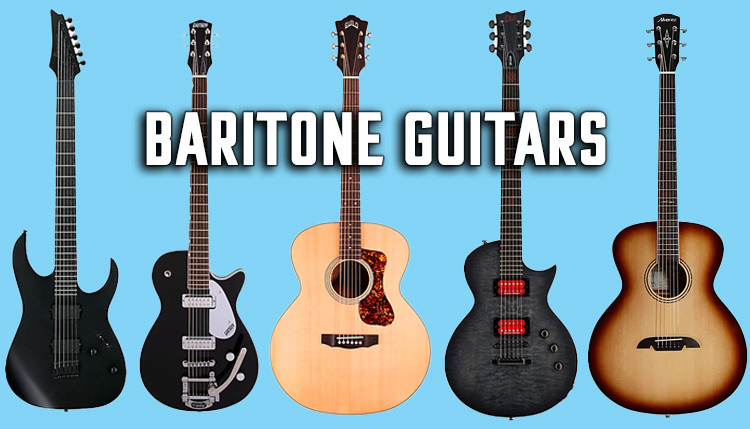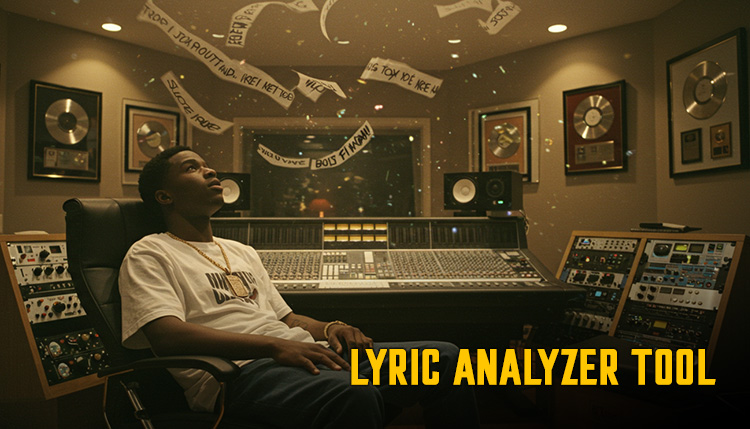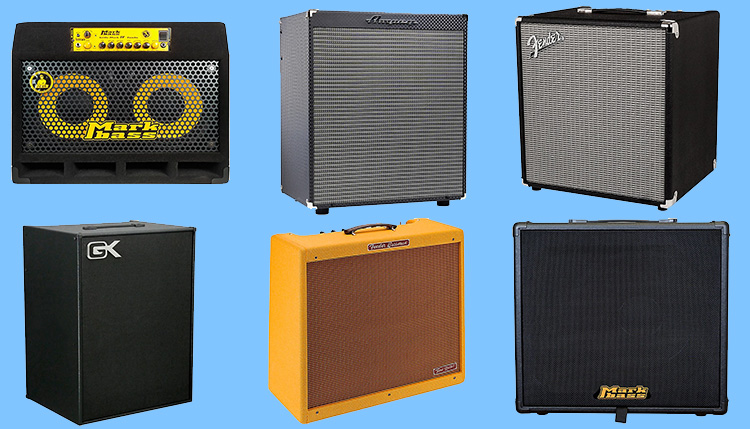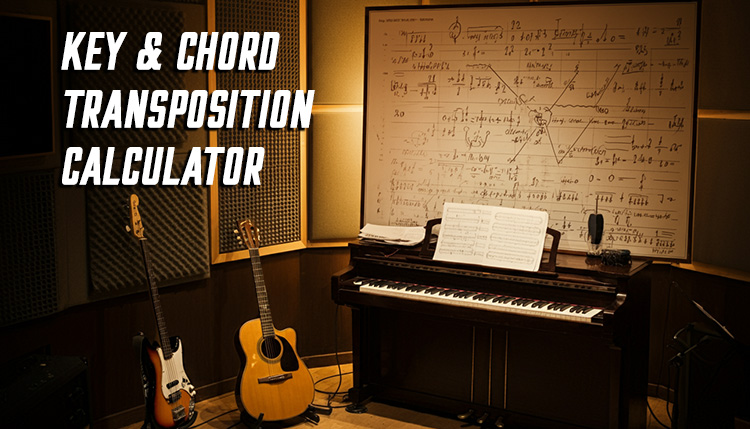Did you know that majority of musicians are self-employed? That’s right – more than half of the music industry is made up of independent artists chasing their dreams!
If you’re ready to join their ranks and turn your passion for music into a full-fledged career, you’ve come to the right place.
I’m going to walk you through the ins and outs of how to start a music career in todays day and age.
Whether you’re a bedroom producer or a seasoned performer, we’ve got the tips and tricks you need to make your mark in the industry.
Let’s dive in and get your musical journey started!
Develop Your Musical Skills and Find Your Unique Sound
Let’s kick things off with the foundation of any music career – your skills and sound.
Trust me, I’ve been there, fumbling through chord progressions and questioning if I’d ever find my “voice” as an artist.
But here’s the thing: everyone starts somewhere, and the key is to keep pushing forward.
Identify Your Strengths
First up, you gotta identify your strengths and weaknesses. Maybe you’ve got killer vocals but your guitar skills are… well, let’s just say they need work. That’s okay!
I remember when I first picked up a guitar – I swear, it sounded like a cat caught in a blender.
But I kept at it, and now? Well, I’m no Hendrix, but I can hold my own.
Pro Tip: Invest time in regular practice.
It sounds obvious, but you’d be surprised how many aspiring musicians skip this crucial step.
Set aside time each day to work on your craft. Even 30 minutes can make a huge difference.
And don’t just noodle around – focus on specific skills you want to improve.
Find Your Sound
Now, let’s talk about finding your unique sound. This is where things get exciting!
Experiment with different genres and styles. I went through a phase where I tried to blend country with some pop and rock.
Yeah, it was as an offshoot for me, but it helped me figure out what I didn’t want to do.
Consider taking music lessons or attending workshops. There’s always room to learn and grow.
I took some songwriting classes a few years back, and it totally transformed my approach to composing.
Practice Routine
Lastly, develop a consistent practice routine. This is where the magic happens.
Set goals for yourself and track your progress. Maybe you want to master that tricky guitar solo or nail those high notes in your favorite song.
Whatever it is, stay focused and keep pushing yourself.
Remember, finding your sound is a journey. It might take time, and that’s okay.
The important thing is to keep experimenting, learning, and growing.
Before you know it, you’ll have a style that’s uniquely yours. And trust me, there’s no better feeling than that!
Create a Strong Online Presence
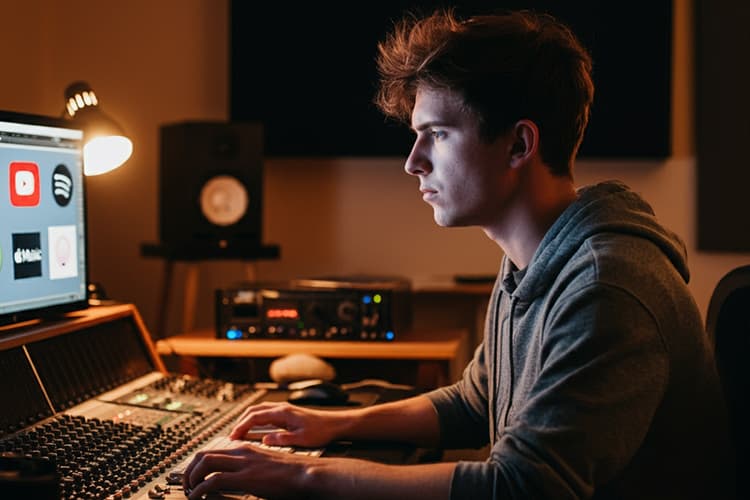
Alright, let’s dive into the digital world!
In today’s music scene, having a strong online presence is just as important as your musical chops.
I learned this the hard way when I first started out – I thought my talent would speak for itself. Spoiler alert: it didn’t.
Professional Website
First things first, you need a professional website. It’s like your digital home base.
I remember my first attempt at building a website… let’s just say it looked like something straight outta the 90s, complete with flashing text and a midi background track. Don’t do that.
Keep it clean, simple, and make sure it showcases your music and brand.
Back in the day you had to know a little bit about CSS and HTML to create a nice site. Today some of the best website builders for musicians are available that make it easy to create a sick website.
Social Media
Next up, social media. Love it or hate it, it’s a necessary evil in the music biz.
Instagram, TikTok, YouTube – these are your new best friends. I was resistant at first, but man, once I embraced it, little things started happening.
Try posting goofy behind-the-scenes videos in the studio, and watch what happens, y0ur fans will love it!
Here’s the key: post regularly and engage with your audience. It’s not enough to just throw content out there and hope for the best.
Respond to comments, ask questions, start conversations. Make your followers feel like they’re part of your journey. After all is it called “social” media.
Hashtags
And don’t forget about hashtags! They’re not just for show – they can seriously boost your visibility.
I once used a trending hashtag related to a popular TV show and gained a bunch of new followers overnight. Just make sure the hashtags are relevant to your content.
Collaborations can be a game-changer too. Reach out to other artists or influencers in your niche. I did a collab with a local producer, and we both saw a significant bump in our follower counts. Plus, it was just plain fun!
Consistency
Now, here’s something I wish someone had told me earlier: consistency is key. It’s better to post regularly (even if it’s just once a week) than to go ham for a month and then disappear for six.
Your followers want to know they can count on you for content.
Be Authentic
Lastly, don’t be afraid to show your personality online. Share your successes, your struggles, your random thoughts. People connect with authenticity.
Remember, building an online presence takes time and effort. Some days it’ll feel like you’re shouting into the void. But stick with it, be authentic, and engage genuinely with your audience.
Before you know it, you’ll have a loyal online following that’s eager to support your music career!
Record and Release Your Music

Alright, it’s time to get your music out there! This is where things start to get real.
I remember the first time I stepped into a recording studio – I was so nervous I could barely hold my guitar. But trust me, once you hear your music come to life, it’s all worth it.
How to Record
First up, let’s talk about recording. You’ve got two main options: invest in your own music production equipment or book time at a professional studio.
If you’re just starting out, home recording can be a great way to get your feet wet. I started with a basic condenser microphone and some free music production software. Was it perfect? Nah. But it was a start.
Pro Tip: If you’re recording at home, pay attention to your room acoustics.
I learned this the hard way when I recorded my first EP in my bathroom (great reverb, terrible idea). A little studio soundproofing can go a long way in improving your recordings.
What to Record
Now, let’s talk about what to record. Start with a demo or an EP. This is your calling card, your musical handshake.
Choose your best songs and really focus on making them shine. Quality over quantity, folks!
How to Release
When it comes to releasing your music, you’ve got options. You can go the traditional route and try to get signed to a record label, or you can release independently.
I chose the indie route, and let me tell you, it’s been a wild ride.
If you’re going indie, music distribution platforms like DistroKid or TuneCore are your new best friends. They’ll get your music onto all the major streaming platforms.
I still remember the thrill of seeing my first single pop up on Spotify. It felt like I’d made it (spoiler: I hadn’t, but it was still awesome).
Release Strategy
Here’s something I wish I’d known earlier: develop a release strategy. Don’t just drop your music and hope for the best.
Build some hype! Tease snippets on social media, maybe do a live stream countdown to the release. Get your fans excited!
And don’t forget about playlists. Getting your music onto popular playlists can be a game-changer.
I spent hours researching and pitching to playlist curators. It was tedious, but when I finally landed on a playlist with 10,000 followers? Worth every second.
Lastly, be prepared for the emotional rollercoaster. Releasing music is exhilarating, terrifying, and everything in between.
I’ve had releases that took off and others that… well, let’s just say they didn’t quite set the world on fire. But each release is a learning experience.
Remember, the goal is to get your music out there. It might not be perfect, but don’t let that stop you.
Every release is a step forward when figuring out how to start a career in music. So take a deep breath, hit that upload button, and let your music fly!
Network and Collaborate in the Music Industry

Let’s talk about one of the most crucial aspects when starting a music career: networking and collaboration.
The idea of networking makes some people break out in a cold sweat, and with good reason. It’s supposed to be all about the music, man! But trust me, the connections you make can be just as important as your talent.
Get Out
First things first, get out there! Attend industry events, conferences, and workshops.
I remember my first music conference – I was so nervous I could barely string two words together. But I forced myself to talk to people, and you know what? I met some amazing folks who’ve become lifelong friends and collaborators.
Pro Tip: Always have some business cards or a way to share your contact info.
I once met a big-time producer at a bar and had to scribble my number on a napkin. Not my smoothest moment.
Organizations
Joining music-related organizations and communities is another great way to network.
A friend of mine became part of a local songwriters’ group, and it was a game-changer for him.
Not only did it take his songwriting to another level, he met some really cool artists who he still works with today.
Collaborations
Now, let’s talk about collaboration. Working with other musicians, producers, and songwriters can take your music to the next level.
I remember my first collab with a producer – it was like he unlocked a whole new side of my sound.
Don’t be afraid to reach out to people you admire.
The worst they can say is no, right?
Mentorships
Seeking mentorship from experienced professionals is huge too.
If you’re lucky enough to find a mentor early in your music career, the guidance they can provide will be invaluable.
They’ll teach you things about the industry that you never would figure out on your own.
Industry Players
Building relationships with music bloggers, playlist curators, and local radio stations is crucial too.
These folks can help get your music heard by a wider audience.
Investing time here and cultivating relationships can really pay off if they start playing your tracks.
Remember, networking isn’t just about what others can do for you. It’s about building genuine relationships.
Be interested in others, offer help when you can, and always, always be professional.
I once showed up late to a meeting with a potential manager because I overslept. Needless to say, that relationship didn’t work out.
Get Online
Lastly, don’t underestimate the power of online networking.
Join music forums, engage in Twitter chats, be active in Facebook groups.
I’ve made some amazing connections just by being active and helpful in online communities.
Networking and collaboration might feel awkward at first, but I promise it gets easier with practice. And the payoff? Totally worth it.
Some of your biggest career opportunities might come through people you meet along the way.
So get out there, make connections, and watch your music career grow!
Understand the Business Side of Music

Alright, let’s dive into the nitty-gritty of the music biz. I know, I know – you got into this for the music, not the paperwork.
But trust me, understanding the business side can make or break your music career.
Copyright
First up, let’s talk about music copyright laws and royalties. This stuff might seem dry, but it’s crucial.
Your songs are your intellectual property, and you need to protect them.
I remember the first time my buddy heard one of his songs in a TV show – it was amazing!
But he wouldn’t have seen a dime if he hadn’t properly registered his work.
Performing Rights Organization
Speaking of registration, you need to get cozy with a performing rights organization (PRO).
These folks collect royalties on your behalf when your music is played publicly.
I’m talking radio, TV, live venues, you name it.
It’s like having a team of royalty-collecting ninjas working for you 24/7.
Licensing
Now, let’s chat about music licensing and sync opportunities. This is where the big bucks can come in.
Getting your music placed in TV shows, movies, or commercials can be a game-changer.
Get a song featured in a car commercial, and let me tell you, that check will be insane!
Contracts
Here’s something I wish I’d known earlier: develop a basic understanding of music contracts and agreements.
The first time I saw a music contract, it might as well have been written in ancient Greek.
But taking the time to learn the lingo and understand what you’re signing is crucial.
Don’t be afraid to ask questions or seek help if you’re unsure.
As your music career progresses, you might want to consider hiring a music lawyer or manager.
A good lawyer or manager can help navigate the complex world of music contracts and negotiations.
Pro Tip: Keep meticulous records of your income and expenses.
I learned this the hard way when tax season rolled around and I was scrambling to find receipts from gigs six months ago.
Trust me, future you will thank present you for staying organized.
Publishing
And don’t forget about music publishing. If you’re writing your own songs, you’re not just an artist – you’re a publisher too.
Understanding how publishing works can open up new revenue streams and opportunities.
Lastly, always be learning. The music industry is constantly evolving, especially in this digital age. Stay up to date on industry news and trends.
I make it a point to read music business blogs and listen to industry podcasts regularly.
Remember, understanding the business side doesn’t make you any less of an artist. If anything, it empowers you to take control of your music career and make informed decisions. So embrace it!
Who knows, you might even find that you enjoy this side of things. (Okay, maybe “enjoy” is a strong word, but you’ll appreciate it, trust me.)
Book Gigs and Build Your Live Performance Skills
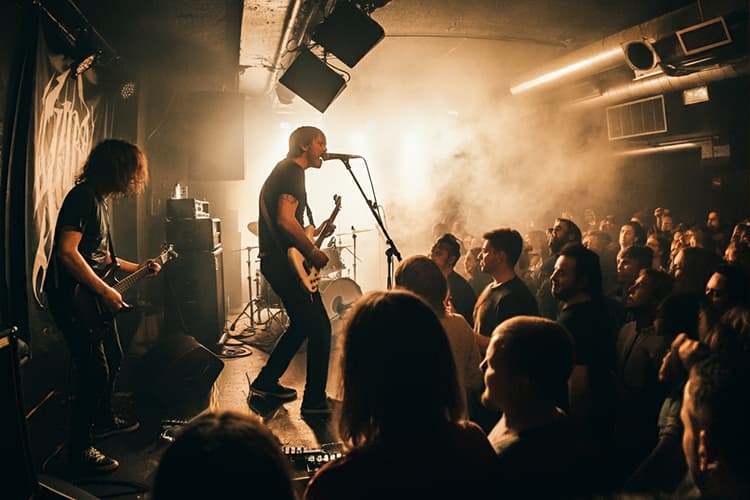
Alright, let’s talk about getting on stage and rocking those live performances! This is where the rubber meets the road, folks.
I remember my first gig like it was yesterday – my hands were shaking so bad I could barely hold my guitar pick.
But let me tell you, there’s nothing quite like the rush of performing live.
First things first, you gotta start somewhere. Local venues, open mic nights, and community events are your new best friends.
I cut my teeth playing at a tiny coffee shops. The pay was… well, let’s just say I got a lot of free lattes. But the experience was invaluable.
Pro Tip: Create a professional press kit and electronic press kit (EPK).
This is like your musical resume. Include your best tracks, a bio, high-quality photos, and any press coverage you’ve gotten.
I learned this the hard way when a manager asked for my EPK and I had to scramble to put something together at the last minute.
Live Shows
Now, let’s talk about your live show. This is your chance to really showcase your talents and connect with your audience.
Develop a compelling set that takes your listeners on a journey.
Mix up the tempo, throw in some crowd interaction, maybe even a cover song or two.
Networking is crucial in the live music scene. Get to know venue owners, promoters, and other performers.
Be professional, reliable, and easy to work with.
I once got an opening slot at a big nightclub because the venue owner remembered me as “that nice guitarist “.
As you build your reputation, start reaching out to larger venues and festivals. This can be intimidating, but remember – everyone starts somewhere.
I remember the first time I played a festival. I was nervous as hell, but it ended up being a really cool experience.
Stage Presence
Here’s something I wish I’d known earlier: practice your stage presence.
It’s not just about the music – it’s about the whole package.
Watch videos of your performances, practice your between-song banter, work on your stage moves.
Technical Issues
Don’t forget about the technical side of things.
Learn about sound checks, working with sound engineers, and troubleshooting common issues.
Getting the vocals right seemed to always be an issue when I would play clubs.
It helped to know exactly what I needed and was looking for when communicating with the sound guy.
The Unexpected
Lastly, always be prepared for the unexpected. Have backup equipment, extra strings, a setlist taped to your guitar (or keyboard, or drum kit).
I once forgot my setlist and had to wing it – let’s just say it wasn’t my finest moment.
Remember, every gig is an opportunity to improve and make new fans. Even if you’re playing to a near-empty room (been there, done that), give it your all.
You never know who might be watching. And most importantly, have fun! If you’re enjoying yourself on stage, your audience will too.
Market Yourself Effectively to Start a Music Career

Alright, let’s talk marketing! I know, I know – you’re an artist, not a salesperson. But here’s the thing: in today’s music world, you’ve gotta wear both hats.
Don’t worry, though – marketing yourself doesn’t have to feel icky or inauthentic. It’s all about sharing your passion with the world.
Your Brand
First up, let’s talk about developing a strong personal brand.
This is more than just a logo or a catchy name – it’s about who you are as an artist.
What’s your story? What makes you unique?
I think I’m still soul-searching to figure out my brand, LOL.
Your brand should reflect your music and personality. Be authentic – fans can smell BS from a mile away.
Content
Creating engaging content is key. And I’m not just talking about your music here.
Behind-the-scenes footage, live streams, blog posts – anything that gives your fans a glimpse into your world.
Do a live stream of your songwriting process, your fans will love it! It will make them feel like they are part of the creative journey.
Email Marketing
Now, let’s chat about email marketing. I know, it sounds old school, but trust me – a solid email list is gold.
These are your die-hard fans, the ones who want to hear from you.
I use my email list to share exclusive content and personal updates.
It’s like having a direct line to your most dedicated supporters.
Just remember to keep your emails interesting and not too frequent – nobody likes a spammer.
Social Media Ads
Social media ads can be a game-changer if used right.
I was skeptical at first, but when I ran my first targeted ad campaign for a new single, I saw a significant bump in streams and followers.
Start small, test different approaches, and see what works for your audience.
Merchandise
Here’s something that took me way too long to figure out: merchandise isn’t just for big stars.
Even if you’re just starting out, having merch is one of many great income streams for musicians. It’s also great way to make extra money and spread your brand.
Start with simple t-shirts and stickers. There’s even print on demand companies that will fulfill orders as they come in so you don’t have to hold or order inventory.
Remember, marketing is all about building relationships.
Engage with your fans, respond to comments, create a community around your music.
I try to reply to every comment and message I get (okay, almost every comment – let’s be realistic here).
Consistency is key in marketing. It’s better to post regularly on one or two platforms than to spread yourself thin trying to be everywhere. I focused on Instagram and TikTok, and it’s worked well for me.
Lastly, don’t be afraid to ask for help. Whether it’s collaborating with other artists on cross-promotions or hiring a PR person for a big release, sometimes bringing in extra support can take your marketing to the next level.
Marketing yourself effectively is an ongoing process. It might feel awkward at first, but keep at it. The more you do it, the more natural it’ll become.
And remember, at the end of the day, it’s all about connecting your music with the people who’ll love it.
So get out there and share your art with the world!
How to Start a Music Career Final Thoughts
Whew! We’ve covered a lot of ground, haven’t we?
From honing your skills to marketing yourself like a pro, learning how to start a music career is no small feat.
But hey, if it was easy, everyone would do it, right?
Remember, the journey to a successful music career is different for everyone.
What worked for me might not work exactly the same for you, and that’s okay!
The key is to take these tips and adapt them to fit your unique style and situation.
As you embark on this wild ride, keep in mind that setbacks are part of the process.
I’ve had my fair share of flops and failures, but each one taught me something valuable.
Don’t let the tough times discourage you – use them as fuel to push harder and grow stronger.
Safety first, folks! As you’re out there gigging and networking, always trust your gut and prioritize your well-being.
The music industry can be intense, so surround yourself with people you trust and don’t be afraid to set boundaries.
Remember, every big-time musician started exactly where you are now.
So keep practicing, keep creating, and keep putting yourself out there. Your big break could be just around the corner.
Now go make some noise!



